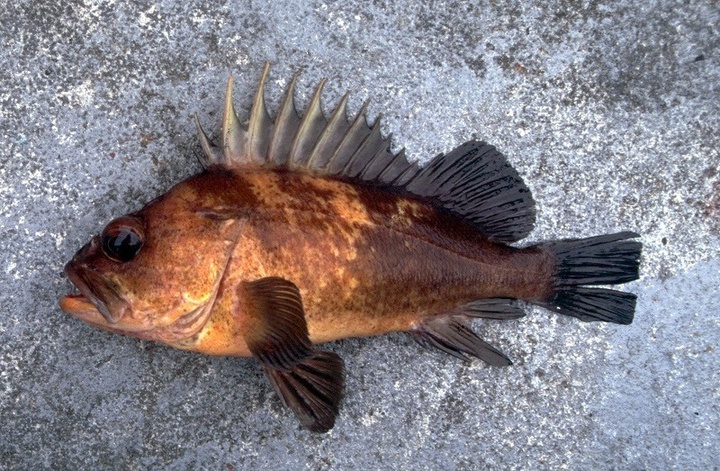Jessica Cejnar Andrews / Monday, Oct. 2, 2023 @ 3:14 p.m.
Crescent City Fishing Owner Steve Huber To Take Del Norte's Groundfish Concerns to Pacific Fisheries Management Council

CDFW scientists say the 2023 quillback rockfish harvest has exceeded the overfishing limit set by federal regulations. | Photo courtesy of the California Department of Fish and Wildlife
Previously:
• Following Groundfish Fishery Closure, Del Norte Fishermen Plan Community Meeting to Advocate For Next Year's Season
###
Steve Huber will speak on behalf of Del Norte County fishermen next month, urging the Pacific Fisheries Management Council to allow the nearshore groundfish season to go forward in 2024.
Huber, owner of Crescent City Fishing Charters, estimates he has lost more than $40,000 as a result of the California Department of Fish and Wildlife’s decision to close the 2023 season on Aug. 21.
The California Department of Fish and Wildlife has asserted that the fishery closure was necessary to protect the quillback rockfish. Huber and local “fisherpeople,” along with county elected officials, have argued that the decision will devastate the economy.
They question the data scientists presented showing that the quillback rockfish is in danger of being overfished. Plus, they say, few fishermen keep quillbacks .
“We call them go-backs,” Huber told the Outpost on Monday. “They took eight weeks of the season away from us — plus our November rock combo trips — so the devastation to just my company was large.”
In addition to choosing Huber to represent them at the PFMC’s meeting Nov. 1-8, the group of local fisherpeople who met in Fort Dick on Thursday are trying to get as many people as possible to submit public comments to the Council.
“The more comments there are, the more they will listen. And we need lots of comments,” recreational fisherman Andrea Spahn wrote in a letter to the community. Spahn, who helped organize last week’s meeting, gave folks a primer on how the PFMC works, and urged folks to tell their story.
“This is what PFMC needs to hear,” she said. “Be proactive not reactive — (tell) how you will commit to helping to protect any endangered species, use descending devices, educate (sic) other fellow fishermen.”
The Crescent City Council is also expected to take up the issue. City Manager Eric Wier said he expected people to comment on it at the City Council’s meeting this evening. Crescent City councilors have until Oct. 12 to submit comments they want included in the PFMC’s agenda packet for November, Wier said.
According to Spahn, people have until Oct. 23 to submit public comments. She urges folks to tell a friend.
“We want to be transparent with everything our little handful of people have done,” Spahn told the Outpost. “The big thing we’re stressing right now is not blaming anybody about the closure. They had to do it, according to their law.”
As of Aug. 21, the recreational boat-based groundfish fishery is only allowed seaward of the 50 fathom — 300 foot — Rockfish Conservation Area boundary line. CDFW closed the nearshore fishery after realizing that the quillback rockfish catch for the season was nearing the overfishing limit of 1.04 metric tons by the end of July, according to Craig Shuman, the department’s marine region manager.
The department’s decision initially impacted fishermen between Cape Mendocino and the Oregon border. But offshore fishing-only rules went into effect statewide on Sept. 16.
On Sept. 12, the PFMC allowed CDFW’s closure of the 2023 groundfish fishery to stand, though many anglers statewide, along with the Del Norte County Board of Supervisors, called for hook and line surveys of quillback rockfish instead of the trawling data the Council used to make its decision.
A normal groundfish season lasts from May 1 through Dec. 31. However, because of the quillback rockfish, according to Huber, CDFW shortened the season so that it would end on Oct. 15. The “rock combo trips” Huber refers to are the rockfish and Dungeness crab charters he offers in November.
Huber said restricting fishing to seaward of 50 fathoms also poses a safety risk for recreational fishermen.
“It’s not a safe area to be out 10 to 15 hours offshore in a little boat with Crescent City not having a Coast Guard station anymore,” he said. “If you need help it comes from Humboldt or Brookings.”
According to Spahn, another issue she and other fishermen are working on is to get California’s halibut quota increased. She said Oregon and Washington are allowed 22 and 28 percent of the overall catch.
CDFW closed the recreational Pacific halibut fishery on Aug. 4 due to the state’s recreational quota of 39,520 net pounds being reached. The quota is determined annually by the International Pacific Halibut Commission.
Pacific halibut are a different species than California halibut and range from the Aleutian Islands to as far south as Point Arena in Mendocino County. California halibut are more common further south, according to the CDFW.
Documents:
• Andrea Spahn's letter to the community
CLICK TO MANAGE